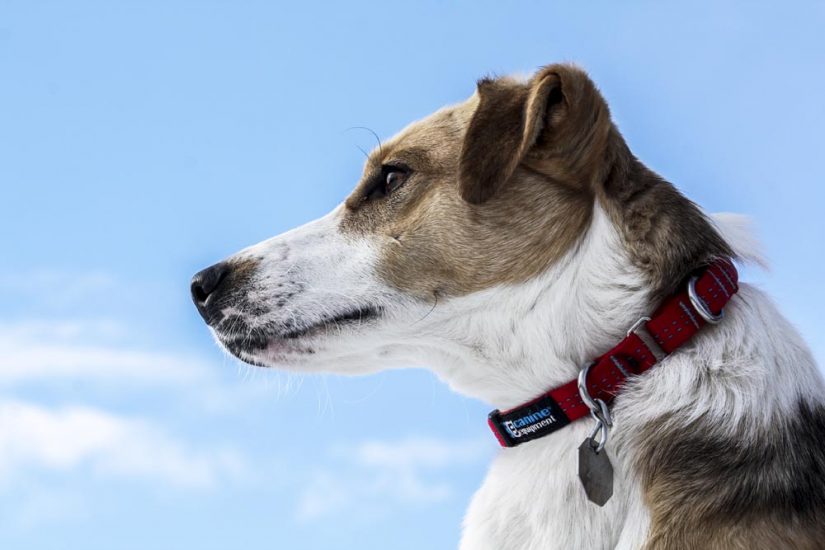Have you lost or found an animal? Search our help topics for what to do next.
Lost & found animals
If you have cats in your community who appear to be living on their own outdoors, there are a few things you can do to help, especially during the winter months.
Get the cat spayed or neutered: The best method of getting feral cat populations under control is through trap-neuter-return (TNR). This involves trapping the cats, getting them spayed or neutered and vaccinated, and then returning them back to their environment. In addition to humanely reducing the population, TNR also improves the health of the cats and makes them better neighbours.
Contact your local SPCA or cat rescue for advice on how to humanely and safely trap a feral cat. They may even have a trap loan or TNR program to assist you. Community programs are available to help spay and neuter cats to help fight the cat overpopulation problem in B.C.
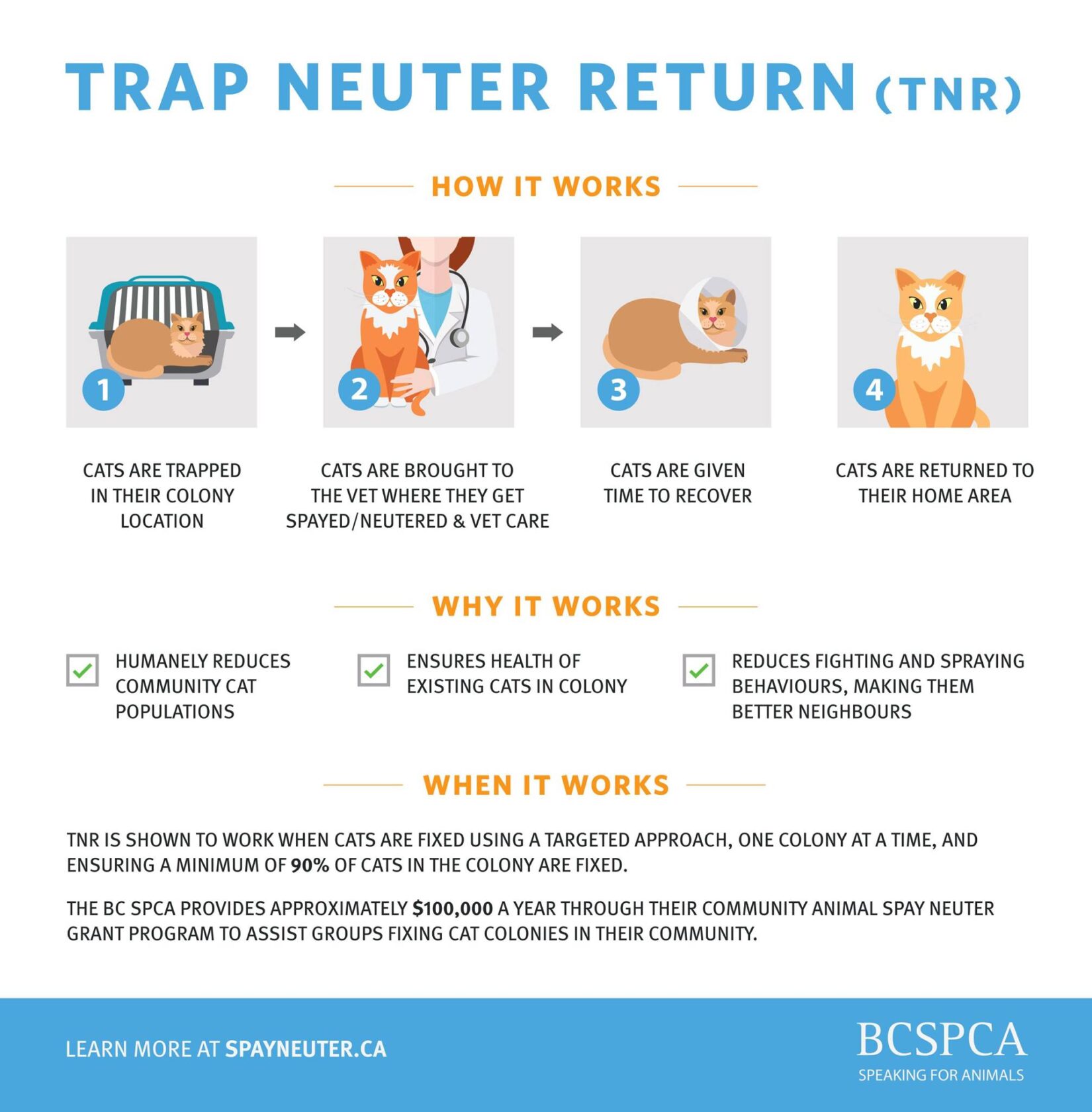
Ensure access to food and water: Food should be left out for cats only during feeding time and then removed to ensure it doesn’t attract wildlife such as raccoons, skunks or bears.
Water should be available at all times. In winter, water sources and wet food can easily freeze over. When you put out water for cats, check it twice daily to make sure it stays ice-free. During the winter, choose dry kibble and ceramic or plastic dishes.
Check your local bylaws: There may be provisions in your municipal bylaw that require you to register the cat colony, or ensure that all cats have permanent identification such as a tattoo or microchip.
Build an outdoor cat shelter: Wintertime is especially hazardous for feral cats. They can struggle through the coldest months of the year to find enough food, water and shelter. Their ears and toes can easily get frostbitten if they don’t have access to a winter shelter.
By providing a cat shelter, cats will be able to escape the wind, snow and rain and make it safely through the cold winter months. Our instructional video walks you through it step by step.
Tap your car: Keep in mind that in the winter months, outdoor cats (and wildlife) may see your car as a warm refuge. Before starting your vehicle, ‘think and thump’ – tap the hood and check between the tires to make sure no cats are hiding underneath or camping out in the engine compartment.
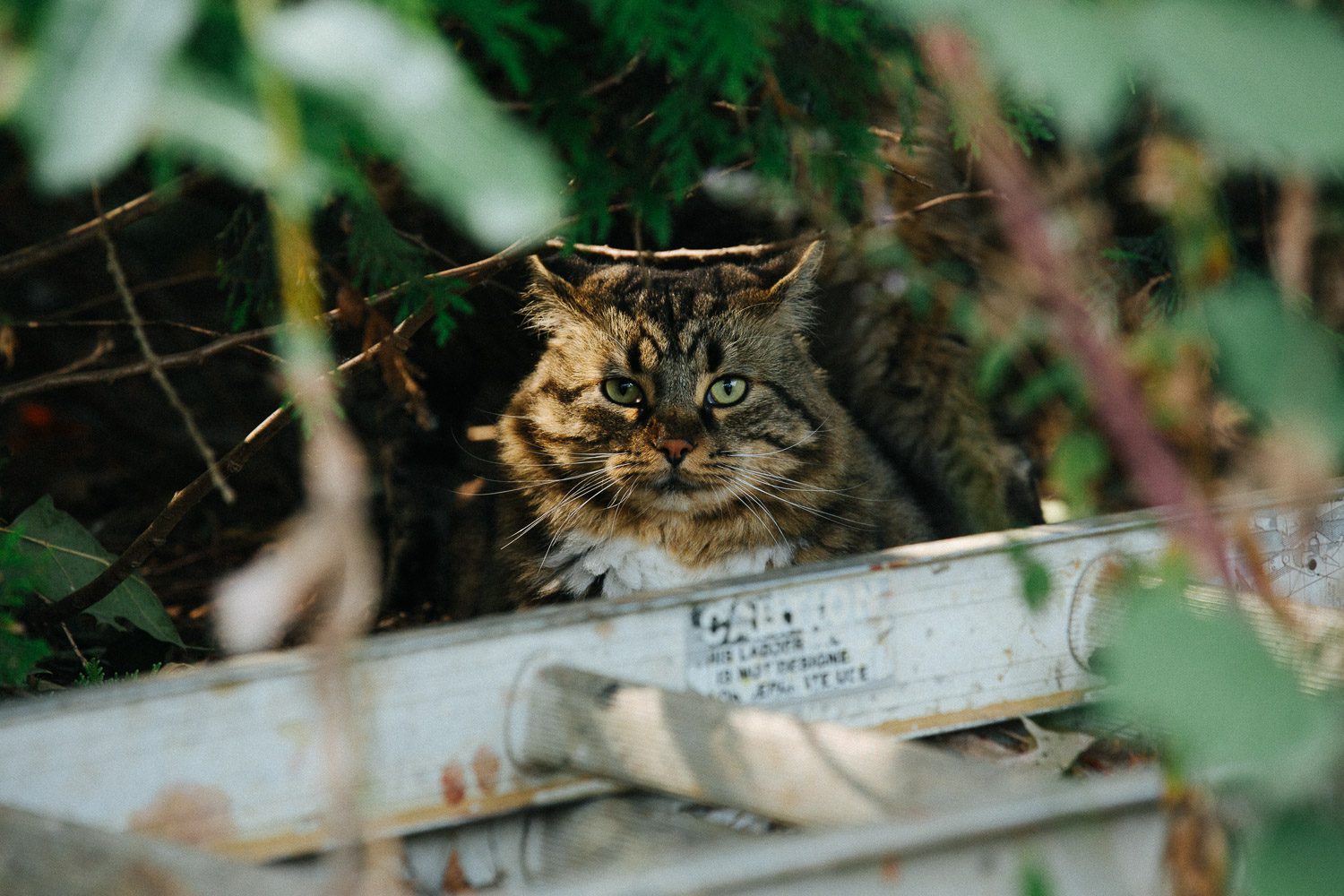
Spay or neuter your own pet: Female cats have a quick reproductive cycle, and cat populations can boom in a very short amount of time. The first step is always to ensure your own pets are spayed and neutered. In addition, we recommend keeping your cat indoors – not only for their own safety, but also to prevent them from catching and spreading diseases or getting lost and ending up part of a feral colony. We have a lot of great tips for how to keep your indoor cat happy and healthy.
Learn more about
Register your pet’s microchip, tattoo or license with the BC Pet Registry. Submitting your pet’s information to this provincial database ensures your pet is traceable by all participating veterinarians, animal control agencies and humane societies.
Find out more about how permanent pet ID can help ensure peace of mind.
Update Your Information
Have you moved or changed your phone number? Keeping your contact information up-to-date is easy with the BC Pet Registry. Registered users can also add additional forms of ID to their existing pet profile free of charge.
To report a lost pet, please contact your nearest BC SPCA branch.

If you have evidence that leads you to believe your pet was stolen, contact the local police or RCMP non-emergency line. Permanent identification, such as tattoos or microchips, can help authorities track your animal.
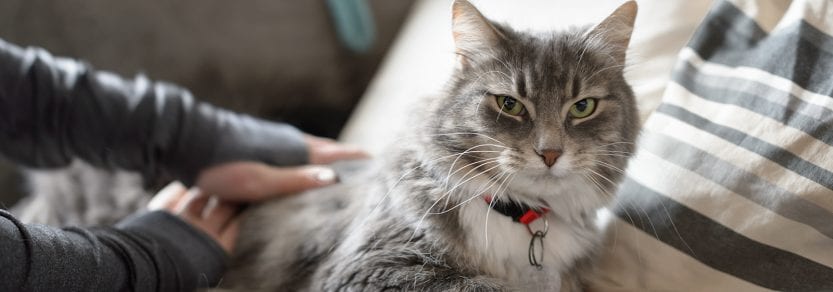
Is your pet’s microchip, tattoo or license registered with the BC Pet Registry? Updates can be made at any time. Registered users can also add additional forms of identification (ID) to their pet profile.
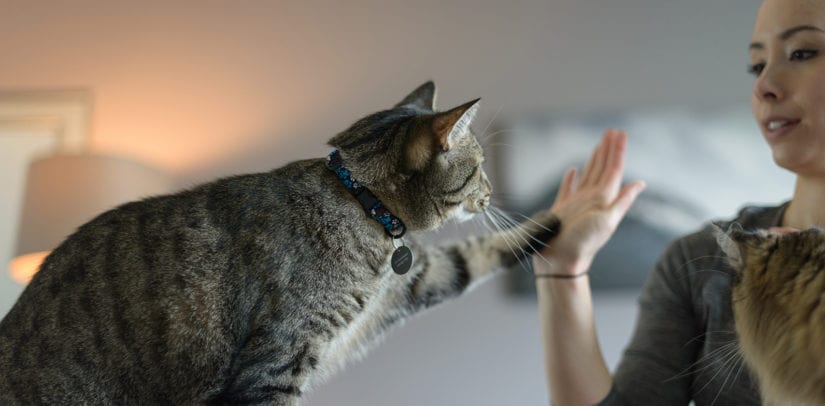
Contact your veterinarian
Call your veterinary clinic so they can update their records. You can also register your pet’s tattoo with the BC Pet Registry.
Contact your municipal animal control office
In most municipalities, you must license your dog. Contact your local animal control office (e.g. City of Vancouver Animal Control) to update your phone number, address or family members on file. You can also register your pet’s municipal license with the BC Pet Registry.

A lost pet can be a stressful situation for both the animal and their family. Most animals belong in the neighbourhoods in which they are found and their guardians may be out looking for them.
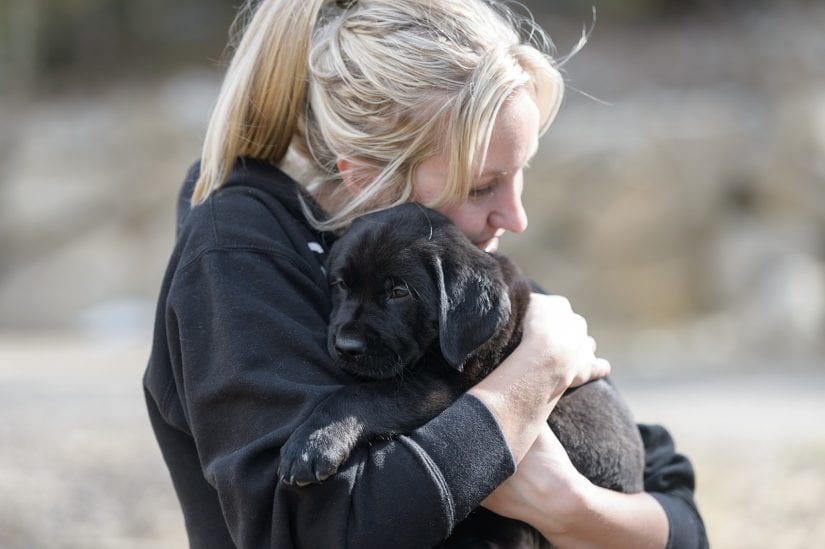
If you think you have found a lost animal, follow these 5 steps to increase the chances of reuniting them with their family.
1.) Look for identification (ID)
Collar and/or ID tag: A collar or tag may have the animal’s home number or address. For dogs, some tags are municipal licenses and may not have the guardian’s contact information. In this case, call the BC SPCA or your local Animal Control who can help track down where the animal lives.
Microchips: Microchips are a reliable form of electronic permanent ID inserted under the animal’s skin. If you do not see a visible form of ID, the animal may have a microchip. You can take the pet to your nearest veterinary clinic, Animal Control agency or BC SPCA animal centre to have the animal scanned for a microchip at no charge.
Ear tattoo: If the animal has an ear tattoo, contact the BC Pet Registry, a local veterinary clinic or animal control agency to trace it. If the tattoo is difficult to read, bring the animal to one of the above locations to read it at no charge. Some vet clinics also keep lost and found pet records and posters.
Other tattoos: Some animals may have a breeder tattoo on their abdomen or inside leg. In this case, contact your local BC SPCA location or Animal Control centre. Often these tattoos are only traceable through the original breeder.
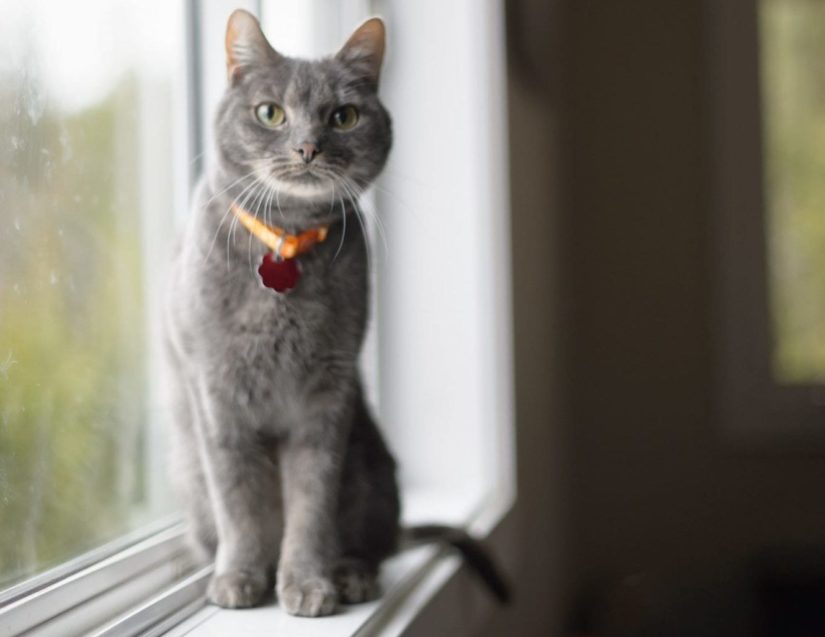
2.) Use the web
Post to social media: Take a quality photo of the animal and circulate it on your Facebook or Twitter networks with the location in which it was found. Encourage your friends to share the photo on their page.
Search online: There are websites dedicated to helping lost animals return to their guardians. These Canadian sites host searchable lost and found animal postings. On each of these websites, you can also publish a “found pet” post:
- BC SPCA Pet Search (search lost animal posts and create a free “found pet” post)
- Missing Pets in BC (search lost animal posts and create a “found pet” post)
- Craigslist (search lost animal posts and create a “found pet” post)
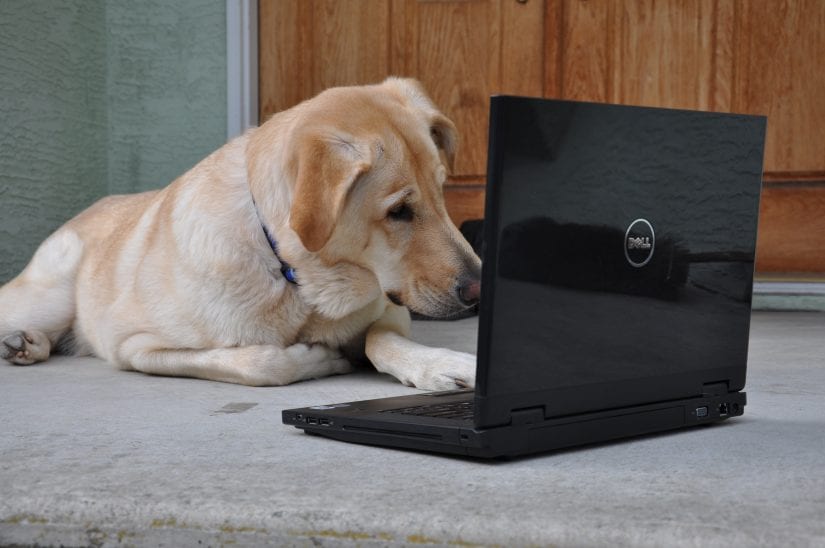
3.) Search the neighbourhood
Talk to people in the neighbourhood: Neighbours in the area, especially other pet guardians, may know the pet you found. Talking with people may help you find the guardian without the animal having to go to an animal centre. If you found the animal in a yard or in front of a residence, knock on the door of that home and kindly ask if it’s their pet or if they know the guardian.
Put up posters: Create your own eye-catching poster or make one for free with the BC SPCA Pet Search. Include a photo, description of the animal, where it was found, and a contact phone number. Post these in as many places as possible near where the animal was found (grocery and corner stores; local parks; telephone poles).
4.) Contact your local BC SPCA animal centre or animal control
Report the animal as found. Let them know if you are willing to hold onto the animal until the guardian comes forward. If you’re unable to hold on to the animal, please contact our BC SPCA Animal Helpline at 1-855-622-7722 for direction on where to take the animal.
5.) Found the pet’s guardian?
If you find the guardian, please remember to contact the groups keeping records and let them know the animal is no longer lost.
What if the animal is not approachable?
Consider your own safety first. If the animal appears unapproachable, do not attempt to catch it. Call your local BC SPCA, Animal Control, police or RCMP.
A lost pet can be a stressful situation for both the animal and their family. Follow these 5 steps and watch our video below for what to do if you’ve lost your pet.
1.) Search the neighbourhood
Search the area in which your pet was lost: Walk or drive through your neighbourhood several times a day, especially early in the morning and at dusk when it is quieter. Call your pet’s name and try shaking a bag of their favourite treats.
Ask around: Talk to neighbours, store owners, joggers, garbage collectors, mail carriers and others. Ask them to be on the lookout for your pet. Your pet may be nearby but too scared to come out, even for you. Ask neighbours if you can search in nearby bushes, garages or sheds.
Try the power of scent: Place a recently worn piece of clothing or one of your pet’s favourite toys outside. Animals have a keen sense of smell and familiar smells can bring them home.
Put up posters: Create an eye-catching “lost pet” poster. You can make one for free when you create an account with the BC SPCA Pet Search. Include a photo, description of the animal, where they were lost and a contact phone number. Post these in as many places as possible near the area in which your pet was lost (grocery and corner stores; local parks; telephone poles, etc.)

2.) Use the web
Post to social media: Use Facebook or Twitter to circulate photos of your pet. Include details such as the area in which they went missing, the day/time of the incident and your contact information. Encourage your friends to share the photo on their page.
Search online: There are websites dedicated to helping lost and found animals return to their guardians. On sites such as the BC SPCA Pet Search, you can create a free account to post a listing or search Found Pet profiles posted by fellow users. You can also search pets brought in as strays to select BC SPCA locations.
- BC SPCA Pet Search (search found animals at the BC SPCA, create a free poster and a “lost pet” post)
- Missing Pets in BC (search found animals and create a “lost pet” post)
- Craigslist (search found animals and create a “lost pet” post)
- Petsearchers Canada (pet detective and tracking service)

3.) Update your pet’s ID registration information
If your pet’s microchip, tattoo or license is registered with the BC Pet Registry, our provincial ID database, you can update your information online or contact our Animal Helpline at 1-855-622-7722.
If your pet’s microchip, tattoo or license is registered with a veterinary clinic or municipality, please contact them to make sure your information is up to date.

4.) Visit BC SPCA Animal Centres, animal control and veterinary clinics
Often animal centres have several animals matching your pet’s description. Visit the centre every 24 hours rather than calling.
Check BC SPCA Animal Centres: Find out if your local BC SPCA takes in stray animals. All stray animals brought to BC SPCA animal centres can be found online using our pet search.
Check animal control (City Pounds): Visit your local city pound or call them to see if an animal matches your pet’s description.
Check veterinary clinics and animal hospitals: If your pet was found injured, they may be at a nearby veterinary clinic or animal hospital.
5.) Don’t give up searching for your pet!
Continue to search for your pet even if you think there is little hope. Many animals who have been lost for months or years have been reunited with their guardians.

Was your pet stolen?
If you have evidence that leads you to believe your pet was stolen, contact the police on their non-emergency line. Permanent identification, such as tattoos or microchips, can help authorities track your animal.
Nobody plans to lose a pet. Prepare for the unexpected by following these steps to provide your pet with identification.
Provide two forms of identification
- A collar and tag: Keep a collar and tag on your pet with your home phone number and address.
- A form of permanent ID (microchip or tattoo): Pets can slip their collars at any time, but they can’t slip a permanent ID. Make an appointment with your vet to get your pet a microchip or tattoo today.
Register your pet’s permanent ID
Register your pet with the BC Pet Registry, B.C.’s first provincial pet ID database, owned and operated by the BC SPCA.
Registration guarantees that your pet can be traced by all participating veterinarians and animal care centres province-wide.
Remember: Permanent ID has little value unless it is registered. Give your pet the protection of registered pet ID today.
Learn more about the BC Pet Registry and how to plan ahead for peace of mind.
Keep your contact information up-to-date
Have you moved or changed your phone number? Don’t forget to update your pet’s ID! Contact your veterinarian with your new information so they can update their records.
Is your pet’s ID registered with the BC Pet Registry? Updating is easy! Log in any time to update your contact information.

Licensing your pet
In most municipalities, a license for your dog is required by law. Call your local city/municipality to update the records on file or to get more information on licensing.
